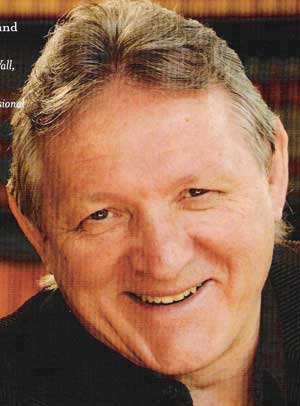|
|
James Ragan is an award-winning poet, playwright, essayist, and screenwriter. Translated into 10 languages, he has authored 8 books of poetry including In the Talking Hours, Womb-Weary, The Hunger Wall, Lusions, Selected Poetry, The World Shouldering I, Too Long a Solitude, and co-editor of Yevgeny Yevtushenko, Collected Poems. He has read for six heads of state, including Mikhail Gorbachev and Vaclav Klaus and for audiences in China, Japan, England, France, Sweden, Brazil, and the Czech Republic, among others. In 1985, he was one of four poets, including Seamus Heaney, Robert Bly, and Bob Dylan, invited to perform at the First International Poetry Festival in Moscow. Raganís honors include three Fulbright Professorships, two Honorary Doctorates, the Emerson Poetry Prize, 8 Pushcart Prize nominations, a Poetry Society of America Citation and the Swan Foundation Humanitarian Award. Raganís plays, The Landlord and Commedia, have been staged in the U.S., China, Greece, and the Soviet Union. He has worked as a screenwriter at Paramount Pictures and later in various production capacities during the making of THE BORDER, THE HOUSE, and the Academy Award winners THE GODFATHER and THE DEER HUNTER. He has a Ph.D. and served for 25 years as the Director of USCís Professional Writing Program. In 1996, BUZZ Magazine named Ragan one of the ď100 Coolest People in Los Angeles: Those Who Make a DifferenceĒ. James Raganís poems are satisfying and distinctive, full of arresting collocations and striking phrases. U.S. Poet Laureate, Richard Wilbur James Ragan dominates the art of image, the art of poetic line, and the art of poetic narration with insight that marks major poets. Nobel Prize Nominee, Miroslav Holub |
|
If For Each of Us a rope could swing us Published in Poetry Magazine A Good Sky
I show you a good sky. Look. It will blanket your sleep It will love you, solely, I show you a good sky. I am no one’s romantic. I show you a falling sun, Look. Here I am, the sky’s moon I show you a good sky, Rilke on the Conveyor Belt A rick of pages, it falls hardly noticed colliding with a carpetbag or steamer There is no fixed point of concentration, Had Rilke, himself, fallen unbound, How many miles had his words trespassed, Unless unsung like a soldier’s duffel, duty bound, |
 |
|
© 2011 James Ragan |
|